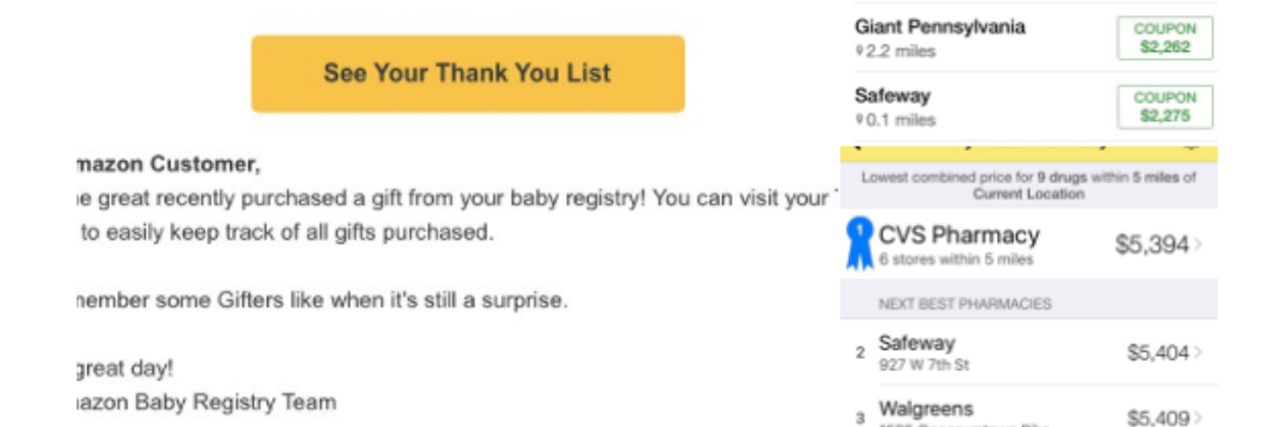On Tuesday, Amazon accidentally emailed customers that an item from their “baby registry” has been purchased and was “on its way.” The email was sent to an undisclosed number of customers, many of whom don’t have registries and aren’t pregnant, including women with infertility.
Amazon has since apologized for “any confusion this may have caused,” however, women with infertility, many of whom received the erroneous email, feel the retail giant doesn’t understand the pain its email has stirred up.
Dear @amazon – Did you really have to send me an email for a baby registry I’ll never have nor created? #infertility cc: @AmazonHelp #fail pic.twitter.com/3nKUpDLEed
— krista moll (@keetots) September 19, 2017
Oops? Really guys? Your apology is bs, do better. #infertility #1in8 @amazon
— Roses Thornes (@RosesThornes) September 20, 2017
The snafu email from @amazon baby registry was a stab to the ❤️. Didnt need reminded of the fertility struggle I'm experiencing #infertility
— Katie (@mkaties1) September 20, 2017
According to the national infertility organization Resolve, infertility affects 10 percent of the population. For people living with infertility, the pain of not being able to conceive is often devastating.
“Infertility treatment is more than just a physical issue. It’s also mental and financial,” Mary Kate McKenna Battles, who received an email from Amazon and is currently undergoing treatment for infertility, told The Mighty. “It takes over every corner of your life, and things like the Amazon debacle just add to the chaos.”
A small computer glitch for U but for MANY women out there a complete week ruiner. Shame on you @amazon #infertility https://t.co/8DYGsL7cQC
— Meg D (@megdecker99) September 20, 2017
Thanks for triggering everyone who has experienced a #pregnancyloss and/or #infertility @amazon with your "accidental" email. ????
— Cristina Robinson (@LovelyGeek) September 20, 2017
@Amazon I am disappointed in you. As someone who struggles with infertility, your email was incrediably hurtful. Do better. Be better.
— Brandi Sestak (@brandisestak) September 20, 2017
In a tweet at Amazon, Battles shared, “Not cool, @amazon. Unless my fertility meds can be on my ‘baby registry’ then this is a cruel, cruel accident.” At the time she received the email, Battles said she and her husband were looking up prices for fertility medications.
“Because infertility medicines are so expensive, you shop for them kind of in a way that you would shop for cheaper notebooks on Amazon,” she said, explaining why she paired her email from Amazon with the prices of her infertility medication. “I never thought [the email] was malicious, obviously accidents happen. But, you know, it’s a bummer when you’re going through this and you only wish you could have an Amazon baby registry.”
Not cool, @amazon. Unless my fertility meds can be on my "baby registry" then this is a cruel, cruel accident. ???? #infertility #Amazon pic.twitter.com/Aj1Ua05tgQ
— Mary Kate McKenna Battles (@DCPhotog) September 19, 2017
Battles hasn’t heard from Amazon since receiving the troublesome email, despite the company saying it has reached out to those who received the message.
The Mighty reached out to Amazon about its baby registry emails and the infertility community, and a representative gave the same statement it shared yesterday: “We notified affected customers. A technical glitch caused us to inadvertently send a gift alert e-mail earlier today. We apologize for any confusion this may have caused.”
Battles and women living with infertility aren’t the only women frustrated by Amazon’s “technical error.” Women who’ve experienced pregnancy loss shared their thoughts as well.
@amazon @AmazonHelp not cool… #miscarriage #IVF #infertility #pregnancyloss pic.twitter.com/RyphraoqM3
— Jenn D (@jenn_d_realtor) September 19, 2017
“We created our registry in 2010 and honestly didn’t even know it was still available to view,” Jenn Dolan shared on Twitter, explaining the pain she’s endured since losing 10 babies to miscarriage after the birth of her son in 2010. “Your erroneous email caused all of those feelings to come back to the surface; especially considering my now 7-year-old son saw it as well and asked excitedly if someone was sending us an actual baby.”
“Please take steps to ensure that this type of error does not happen to us, or anyone else who may be suffering through the same pain we are,” she added.

